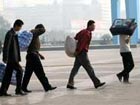| Videos | • Latest |
|
• Feature | • Sports | • Your Videos |
Migrant workers on the road to embrace urban life

 0 Comment(s)
0 Comment(s) Print
Print E-mail CNTV, February 8, 2012
E-mail CNTV, February 8, 2012
Spring Festival is officially over, and that means migrant workers are going back to work in the cities. It also means new businesses are starting up. As China undergoes urbanization on a wide scale, migrant workers' job preferences are also changing.
Large numbers of migrant workers are returning to Beijing for work after a short reunion with families during Spring Festival. In the exits of the main stations, they can find leaflets and maps to aid their job search. For those who are unfamiliar with the city, it brings them new opportunities.
Zhang Gajun, a migrant worker, said, "I arrived yesterday. I want to find a job with regular hours so I can rest properly and stay positive at work. I also want to walk around Beijing and think about my future in the city."
In local recruitment agencies, people can search for the latest vacancies in the online system. But these days low-level positions are becoming harder to fill. The number of waiters needed is 15 times more than the number of applicants.
Zhang Jinhua, manager of Beijing Haidian Recruitment Center, said, "As the distance between the city and countryside is narrowing, many people choose to work in their hometown instead of going to big cities. Nowadays, migrant workers are more rational - most of them won't come to the city unless they have secured a job from friends or relatives."
Shi Shaohua, construction site manager, said, "We were a bit short of hands around the Chinese New Year, so we went to the countryside and recruited many staff straightaway."
Feng Yushen, a migrant worker, said, "We are paid quite fairly and the work conditions are much better. This job seems quite stable to me."
As China becomes more urbanized and its job market matures, migrant workers are finding they have more choices when it comes to looking for jobs. The migrant worker population is on a road to embrace urban life - a road that is much wider, and more accepting, than what it used to be.






Go to Forum >>0 Comment(s)